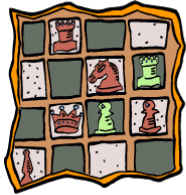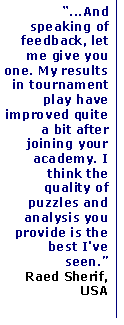
Columns
Your membership will give you
access to the column I write every week about the chess world, and its many
events. You may read some older sample articles below to see the style they
are written in. Of course, all the Academy materials remain in the archives, so as long as
you remain a member, you will always have access to them. Please enjoy!
Stop...and Play Chess
If you live in today’s America, even if you don’t have children, you must be aware of the growing education problem. Everybody seems to be concerned about all the potentially bad influences children get from the entertainment boom, and it is generally agreed that teenagers get in trouble, no matter what.
Parents are especially worried, because jobs and other duties keep them more than ever away from their children, who obviously need their supervision. Add to all this, the fact that, as Mark Twain suggested, children tend to do just the opposite of what they’re told, and you get a rather bleak picture.
In my opinion, our entire approach to this problem needs an overhaul. As a teenager I can say, that no matter how much we’re being told, unless we think it is best, or someone holds a gun to our head, we’re not going to do it. Raising children like army recruits, by orders, is not working. The solution to this problem lies in teaching the children how to think, so that they can decide by themselves what is good and what is bad for them.
Of course, then comes the valid question "how can you make kids think?" One way to do it is to post red stop traffic signs with the inscription "Stop and Think" everywhere, as a local school recently did, but coming from a communist country where we were fed slogans with the hour, I have strong doubts about this method.
The other alternative is to use a game, that children play and enjoy, and that teaches them to think, without even noticing. After all, isn’t this what you do every single move in a game of chess: stop and think? Benjamin Franklin observed more than 200 years ago that "several very valuable qualities of the mind are to be acquired or strengthened by chess, so as to become habits, ready on all occasions." Why not listen to him, and give more kids the opportunity to learn this wonderful game, raising a generation of people who think before they act.
Maybe, instead of posting scary red signs on all their benches, we should give children chess boards and tell them to "stop...and play chess"!
The First Chess Club
You must know that chess is one of the oldest games around, but do you know where it was played, let’s say, 250 years ago? There were no chess clubs at that time, but there were plenty of cafes instead. Only one of these cafes, however, is credited as being the world’s first chess club: Café de la Regence in Paris.
The well known French philosopher Diderot wrote as early as 1762 that "Paris is that certain place in the world, and Café de la Regence is that certain place in Paris, where one can find at anytime the best chess players in the world." And, truly, such famous chess names like Philidor, Capablanca, Morphy, Lasker, Steinitz, Alekhine, were regular customers of the café - an attraction good enough for some very well known spectators: Voltaire, Rousseau, Franklin, Napoleon, Danton, and many others.
The atmosphere inside the café was definitely favorable to chess: the ceiling was built like a chess board, all the walls were covered with paintings of chess pieces, and the names of the best players were inscribed with golden letters. The owner of the café, a chess enthusiast himself, worked hard to make it a real home, and a necessary stopover for any self respecting chess player passing through the French capital.
As the years went by, the café also became an important tourist attraction, and not only for chess lovers. Visitors could even see the table at which Napoleon played, and often lost, before becoming the French emperor.
As you can imagine with such important customers, there are many interesting stories related to this café, and I promise to share them with you in my next week’s column. Meanwhile, you are probably wondering what has become of the Café de la Regence. Well, after two devastating world wars, it has lost all its chess artifacts, and has become a small restaurant, with very little to distinguish it from the dozens of other Parisian restaurants. Nevertheless, it will always remain an important part of chess history, and a name that chess players everywhere will remember as the world’s first chess club.
Chess Can Even Save Lives
After writing about the world’s first chess club, Café de la Regence, I would like to share with you one of the many interesting stories related to this important piece of chess history.
It was the end of the XVIIIth century and Paris was going through the tumultuous times of the French Revolution. Maximilien Robespierre, the leader of the Jacobins, and one of the Revolution’s most important figures, had already instituted the so-called Terror regime, eliminating most of his political adversaries in a series of cruel executions. Nevertheless, between politics, he still found time to enjoy an occasional game of chess at the Cafe de la Regence.
During one of his café visits, he lost a game against a young opponent he had never seen before. According to the usual procedure of those years, a procedure that unfortunately did not survive the passing of the centuries, Robespierre reached for his wallet and asked his opponent, how much he owed him for the defeat.
The young adversary stood up and in a scared, but firm voice told him "yes, you lost the game, but all I claim is the life of an innocent man." With these words he handed Robespierre a release note for the Marquis de Merin, who had recently been condemned to death. "All I ask you is to sign it," he continued. The incredible courage of his opponent made Robespierre curious, so he asked him who he really was. The answer was just as amazing: "I am his wife." Having said that, she took off her wig, letting the hair float out.
Without saying another word, Robespierre signed the release note and left in a hurry. It was a long time before he returned to the café.
Is there a moral to this story? The moral I like is that when you beat someone at chess you can ask him for anything. Unfortunately, that is not true, so let’s just consider it a fascinating story in the long history of the world’s first chess club.
Chess Will Not Disappear
The recent match between world chess champion Garry Kasparov and " the king of the computers," Deep Blue, has once again brought some old discussion topics in the spotlight: "can the computer rule the chess world?", "how long before a computer beats everybody?", and even more radical questions such as "will computers enslave human kind?"
To me, the last question doesn’t seem that radical. After all, I feel a little bit too dependent on these machines every time I call to make a reservation, pay my bills, or renew my drivers license and the sarcastic reply I hear is "call back, our computers are down." I am sure that many readers have been through these shocking experiences before.
Nonetheless, having a computer beat us at our most revered game of intelligence seems even scarier. Some people thought that computers, with their incredible processing capacities, should have beaten us a long time ago. Facts, however, prove that things are not so clear. Chess is such a complex game, even a computer has trouble calculating everything. Which shouldn’t be so surprising having in view that there are more possibilities in a forty-move game than electrons in the universe...
Another fact is that computers, by definition, waste a lot of their time calculating very bad moves, that a human wouldn’t even take into consideration. Intuition remains our important strength, and as the recent match proved, it will continue to do so for some time.
On the other hand, I disagree with those people who believe that computers will never become better than humans at chess. The constant advances in technology will sooner or later create a new generation of computers, for which even calculating possibilities equal to the number of electrons in the Universe won’t be a problem.
Does this mean that the technological advances will eliminate chess? I can only reply with another question: "Did the invention of the bicycle eliminate running?"
TotalChess.com™ and Internet Chess Academy™ are trademarks of Caissa
International Corporation. Copyright © 1996-2003 Gabriel Schwartzman. All rights reserved.